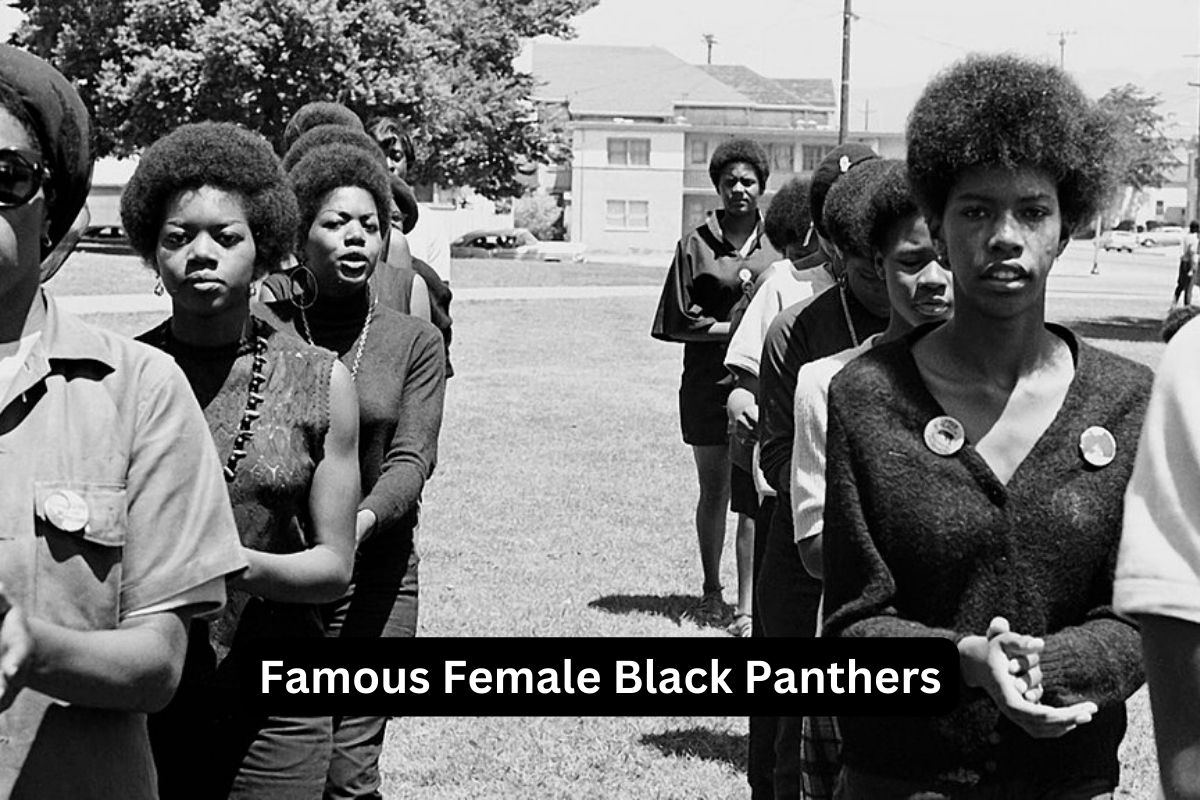These fierce and fearless women shook the foundations of injustice, igniting a powerful movement that reverberated across the nation. They were the female Black Panthers, passionate warriors for equality and justice.
These women challenged racial oppression, fought against systemic injustices, and advocated for the rights of black communities.
From Angela Davis’s radical activism to Assata Shakur’s exile, Elaine Brown’s leadership, and Kathleen Cleaver’s advocacy, these women played crucial roles in shaping the Black Panther Party’s agenda and fighting for equality.
Their courage, resilience, and dedication continue to inspire generations in the ongoing pursuit of racial justice and social transformation.
Famous Female Black Panthers
1. Angela Davis
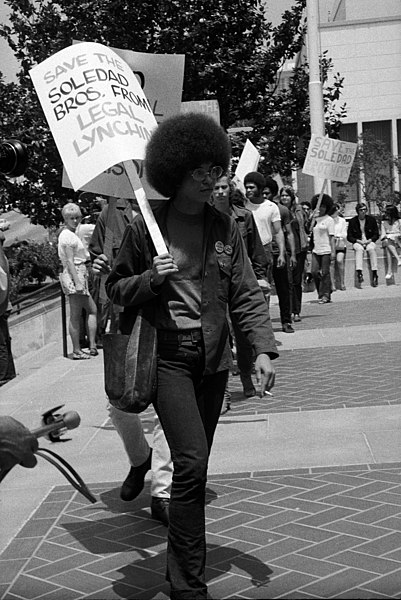
Angela Davis is a highly respected activist, scholar, and author who rose to prominence through her affiliation with the Black Panther Party during the late 1960s.
Born on January 26, 1944, in Birmingham, Alabama, Davis grew up in a racially segregated environment, which ignited her passion for fighting against systemic racism and social injustice.
Davis became an active participant in various social justice movements of the time, including the civil rights movement and the anti-war movement. Her association with the Black Panther Party, a revolutionary organization aimed at empowering and protecting African Americans, played a pivotal role in shaping her activism.
As a member of the Black Panthers, Davis engaged in community organizing, advocating for political prisoners, and participating in protests against racial discrimination and police brutality. She firmly believed in the need for self-defense and community empowerment as means to combat systemic oppression.
In 1970, Davis found herself at the center of a highly publicized trial after being charged with murder, kidnapping, and conspiracy in connection with a deadly courthouse incident. The case garnered international attention and became a rallying point for activists worldwide who saw Davis as a symbol of resistance against racial and political repression.
After spending over a year in jail, Davis was acquitted of all charges in 1972. Her trial and subsequent acquittal solidified her status as an influential figure in the fight for civil rights and social equality. Davis’s experience and perspectives as a black woman activist in America have contributed significantly to the discourse on race, gender, and class.
Following her release, Davis continued to make significant contributions to academia. She became a professor of philosophy and women’s studies at the University of California, Santa Cruz, where she inspired and educated generations of students through her teachings on feminism, Marxism, and the intersections of race, class, and gender.
Davis has authored several impactful books that continue to shape critical theory and social justice movements. Her works, such as “Women, Race, and Class” and “Are Prisons Obsolete?,” critically examine the structures of power and advocate for the abolition of prisons as a transformative step towards a more just society.
Throughout her life, Angela Davis has remained a dedicated advocate for racial equality, economic justice, and political activism. She has consistently used her platform to raise awareness about the ongoing struggles faced by marginalized communities and to promote the necessity of collective action in the pursuit of social change.
2. Assata Shakur
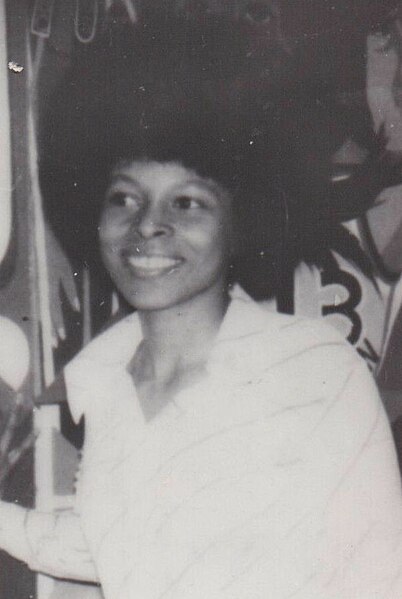
Assata Shakur, born JoAnne Chesimard, is a prominent figure associated with the Black Panther Party and the Black Liberation Army. Born on July 16, 1947, in Queens, New York, Shakur became involved in civil rights activism during the late 1960s and early 1970s.
Also Read: Black Panthers Facts
Shakur’s commitment to combating racial injustice led her to join the Black Panther Party, a revolutionary organization that sought to challenge systemic oppression and uplift the black community. She later became a member of the Black Liberation Army, an armed militant group that aimed to achieve black liberation through direct action.
Shakur’s activism and involvement with these organizations drew the attention of law enforcement agencies, leading to her arrest and subsequent trial on charges including murder, attempted murder, and armed robbery. She was convicted for the 1973 murder of a New Jersey State Trooper and sentenced to life in prison.
In 1979, Shakur escaped from prison and eventually sought political asylum in Cuba, where she remains in exile to this day. Shakur’s case has been highly controversial, with supporters viewing her as a political prisoner and freedom fighter, while authorities have labeled her a fugitive and domestic terrorist.
Throughout her life, Assata Shakur has continued to be an influential figure, particularly within the realms of civil rights, racial justice, and revolutionary activism. Her autobiography, “Assata: An Autobiography,” published in 1987, has provided insights into her experiences and perspectives as an activist fighting against systemic racism and state repression.
Shakur’s story and her unwavering commitment to the liberation of black people have made her an enduring symbol of resistance. She remains a subject of ongoing debate, with her supporters viewing her as a symbol of defiance against unjust systems, while others consider her a criminal.
3. Elaine Brown
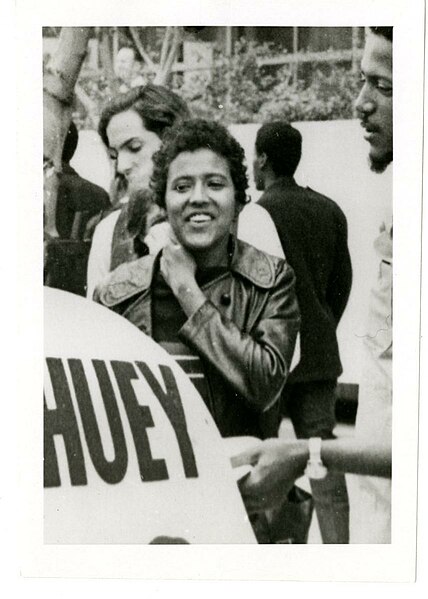
Elaine Brown is a notable activist and former leader in the Black Panther Party. Born on March 2, 1943, in North Philadelphia, Pennsylvania, Brown played a significant role in shaping the party’s trajectory during the 1970s.
In 1974, Elaine Brown became the first and only woman to lead the Black Panther Party as its Chairwoman. Her leadership marked a pivotal moment for the organization, as she sought to expand its community service programs and address issues affecting black communities across the United States.
Under Brown’s leadership, the Black Panther Party emphasized community organizing, education, and social programs. She focused on initiatives such as free breakfast programs for children, health clinics, and legal aid services, which aimed to uplift and empower marginalized communities.
Brown also sought to unify diverse movements by collaborating with other activist groups, including feminist organizations and anti-war groups. She emphasized the importance of intersectionality, recognizing the interconnectedness of various forms of oppression and advocating for a comprehensive approach to social justice.
After leaving the Black Panther Party in 1977, Brown continued her activism in different arenas. She ran for political office, including a mayoral campaign in Oakland, California, in 1998. Brown has also been involved in community development projects, working to address economic disparities and advocate for the rights of marginalized populations.
Elaine Brown has written extensively about her experiences and perspectives. Her memoir, “A Taste of Power: A Black Woman’s Story,” published in 1992, provides insights into her time in the Black Panther Party and her reflections on the challenges and triumphs of the movement.
Throughout her life, Elaine Brown has remained committed to advocating for racial and social justice. Her contributions as a leader in the Black Panther Party, her focus on community empowerment, and her ongoing activism have left a lasting impact on the struggle for equality and the pursuit of a more just society.
4. Kathleen Cleaver
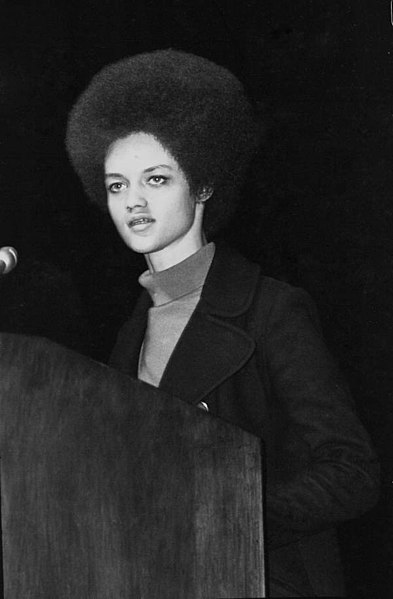
Kathleen Cleaver is a prominent figure in the history of the Black Panther Party. Born on May 13, 1945, in Dallas, Texas, Cleaver played a significant role in the organization as a prominent activist and the wife of Eldridge Cleaver, one of the party’s co-founders.
Cleaver’s involvement with the Black Panther Party began in the late 1960s. She became a spokesperson for the party, addressing issues such as racial inequality, police brutality, and the empowerment of black communities. Her eloquence and powerful voice made her a respected figure within the party and the broader civil rights movement.
As the Black Panther Party’s communications secretary, Cleaver worked to shape the party’s public image and disseminate its message to the wider public. She used various platforms to highlight the party’s efforts and advocate for social change.
In addition to her work within the party, Cleaver was an instrumental force in the party’s community service initiatives. She helped establish and run the Black Panther Party’s Free Breakfast for Children program, which provided meals to thousands of underprivileged children across the United States.
After the decline of the Black Panther Party, Cleaver continued her activism in various capacities. She earned a law degree and pursued a career as a lawyer, focusing on civil rights issues and criminal defense. Cleaver has been involved in advocating for prisoners’ rights and challenging systemic injustice within the legal system.
Throughout her life, Kathleen Cleaver has remained committed to advancing social justice and racial equality. Her contributions to the Black Panther Party, both as a prominent figure and through her community service work, have left a lasting impact on the struggle for civil rights and the pursuit of a more equitable society.
5. Ericka Huggins
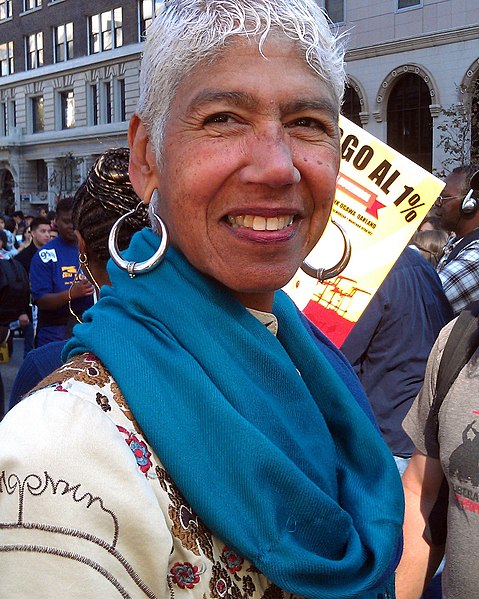
Ericka Huggins is a notable activist and former member of the Black Panther Party. Born on February 20, 1951, in Washington, D.C., Huggins played a vital role in the party’s community organizing efforts and was involved in various social justice initiatives.
Huggins joined the Black Panther Party in 1968, becoming one of its prominent female members. She dedicated herself to grassroots activism and community empowerment. Huggins worked as a teacher and organizer, focusing on educational programs and community service.
One of Huggins’s significant contributions was her involvement in the establishment of the Black Panther Party’s Oakland Community School. This school provided quality education to children in the African American community and emphasized the importance of cultural pride and self-determination.
During her time in the Black Panther Party, Huggins also worked on initiatives related to health care, legal support, and food programs. She played an essential role in organizing the party’s Free Breakfast for Children program, which aimed to combat hunger and provide nutritional support to underprivileged youth.
Huggins’s activism extended beyond the party’s activities. She participated in community outreach programs, advocating for social justice, women’s rights, and racial equality. Huggins’s work demonstrated her commitment to empowering marginalized communities and challenging systemic injustices.
In 1969, Huggins faced legal persecution when she was arrested and charged with murder and kidnapping. After spending two years in jail and enduring two high-profile trials, she was acquitted of all charges in 1971. Her experience highlighted the government’s targeting and repression of Black Panther Party members.
Following her release, Huggins continued her activism, focusing on education, human rights, and prison reform. She has been involved in teaching, speaking engagements, and advocacy work centered around youth development and social change.
Ericka Huggins’s dedication to community service, education, and activism has left a lasting impact on the Black Panther Party’s legacy and the broader struggle for civil rights. Her work exemplifies the party’s commitment to empowering marginalized communities and fighting against systemic oppression.
6. Afeni Shakur
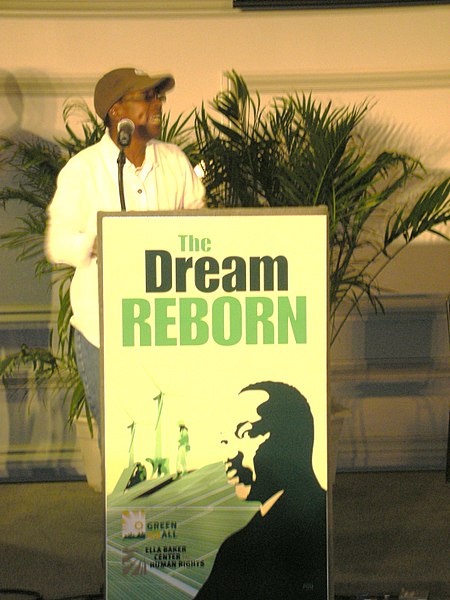
Afeni Shakur, born Alice Faye Williams on January 10, 1947, was an influential member of the Black Panther Party and a social activist. She is perhaps best known as the mother of renowned rapper Tupac Shakur, but her own contributions to the movement should not be overlooked.
Afeni Shakur became involved with the Black Panther Party in the late 1960s, inspired by its mission to challenge systemic racism and advocate for the rights of African Americans. She actively participated in the party’s activities, working alongside fellow activists to address issues such as police brutality, poverty, and political empowerment.
Shakur played a significant role in organizing and promoting community-based programs initiated by the Black Panther Party. She contributed to the party’s efforts to provide free breakfast programs for children, establish health clinics, and organize legal aid services. These initiatives aimed to uplift and support disadvantaged communities, particularly African American communities.
Beyond her involvement with the Black Panther Party, Afeni Shakur later became a prominent advocate for social justice and the arts. She founded the Tupac Amaru Shakur Foundation, named after her son, to promote arts education and provide resources for young people to express themselves creatively.
Afeni Shakur’s commitment to activism and social change extended beyond her association with the Black Panther Party. She continued to use her platform and influence to address issues affecting marginalized communities, advocating for equal rights and opportunities.
Although she is widely recognized as Tupac Shakur’s mother, Afeni Shakur’s activism and dedication to social justice have left a lasting impact on the fight against racial inequality and systemic oppression. Her contributions to the Black Panther Party and her ongoing work as an advocate serve as a testament to her enduring legacy.
7. Fredrika Newton
Fredrika Newton, born on July 9, 1945, is an esteemed activist and the widow of Huey P. Newton, one of the co-founders of the Black Panther Party. Throughout her life, Newton has been dedicated to advancing social justice and carrying on the legacy of the party.
Fredrika Newton actively supported the Black Panther Party’s activities during its early years and played a crucial role in the party’s community service programs. She worked alongside her husband, Huey P. Newton, to establish the party’s Free Breakfast for Children program, which provided nutritious meals to children in underserved communities.
After the death of Huey P. Newton in 1989, Fredrika Newton continued her activism, advocating for the rights of political prisoners and working to preserve the memory of the Black Panther Party. She became the co-founder and director of the Dr. Huey P. Newton Foundation, an organization dedicated to archiving and sharing the history and teachings of the Black Panther Party.
Fredrika Newton has been instrumental in ensuring that the contributions and achievements of the Black Panther Party are recognized and understood by future generations. She has worked tirelessly to counter the misconceptions surrounding the party and to highlight its focus on community empowerment, self-defense, and social programs.
Beyond her activism, Fredrika Newton has also been involved in educational initiatives. She has worked as an educator, sharing her knowledge and experiences with young people and inspiring them to become active participants in creating a more just society.
Through her work and dedication, Fredrika Newton continues to carry forward the ideals and principles of the Black Panther Party. Her commitment to social justice, community empowerment, and preserving the legacy of the party have made her a significant figure in the ongoing struggle for racial equality and social transformation.
8. Frances Beal
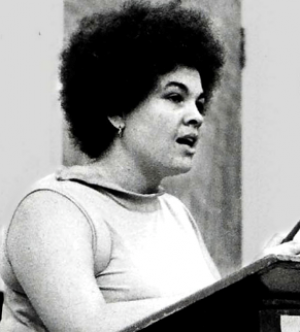
Frances Beal is an influential figure in the history of the Black Panther Party and a prominent activist. Born on March 12, 1940, in Baltimore, Maryland, Beal made significant contributions to the advancement of civil rights and women’s rights within the party.
Beal joined the Black Panther Party during the late 1960s and became a key leader in the organization. She co-founded the Black Women’s Liberation Committee, which aimed to address issues specific to black women and challenge the male-dominated narrative within the party and society as a whole.
As a part of the Black Women’s Liberation Committee, Beal worked to shed light on the unique experiences and challenges faced by black women. She advocated for an intersectional approach that recognized the interconnectedness of race, gender, and class, emphasizing the importance of addressing multiple forms of oppression simultaneously.
Beal’s activism within the Black Panther Party was instrumental in promoting the idea that women’s liberation was integral to the broader struggle for racial justice. She pushed for equal representation, leadership opportunities, and the recognition of the vital contributions made by black women within the party.
Beyond her work in the Black Panther Party, Beal has continued her activism and advocacy throughout her life. She has been involved in feminist and anti-racist organizing, focusing on issues such as reproductive rights, healthcare, and economic justice.
Frances Beal’s efforts and insights have made a lasting impact on the fight for gender and racial equality. Her work within the Black Panther Party and her dedication to challenging the intersections of oppression have helped shape the discourse around social justice and the role of women in the struggle for liberation.
9. Angela Y. Davis
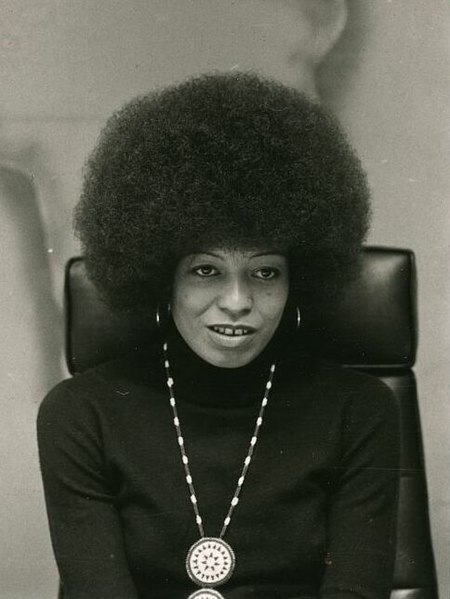
Angela Y. Davis is a renowned activist, scholar, and writer who has made significant contributions to the Black Panther Party and the broader social justice movement. Born on January 26, 1944, in Birmingham, Alabama, Davis became involved with the Black Panther Party in the late 1960s.
Davis’s activism and scholarship have focused on issues such as racism, capitalism, feminism, and prison abolition. As a member of the Black Panther Party, she was actively involved in various initiatives aimed at combating police brutality, racial injustice, and economic inequality.
Davis’s involvement with the party and her radical views made her a target of law enforcement agencies. In 1970, she was arrested and charged with murder, kidnapping, and conspiracy in connection with a courtroom incident. Her arrest and subsequent trial gained international attention, leading to a global movement advocating for her freedom.
Davis’s activism extends beyond her involvement with the Black Panther Party. She has been a prominent advocate for prison abolition, emphasizing the need to transform the criminal justice system and address the systemic issues that contribute to mass incarceration.
As an academic, Angela Y. Davis has written extensively on issues of race, gender, and class. Her influential books, including “Women, Race, and Class” and “Are Prisons Obsolete?,” have made significant contributions to critical theory, feminist theory, and social justice scholarship.
Throughout her career, Davis has remained a powerful voice for social change and political activism. She continues to lecture, teach, and engage in public speaking engagements to raise awareness about systemic oppression and inspire others to take action.
Angela Y. Davis’s activism and intellectual contributions have made her an iconic figure in the struggle for racial and social justice. Her dedication to challenging structures of power and advocating for marginalized communities has left an indelible impact on the Black Panther Party, the broader social justice movement, and the ongoing fight against inequality.
10. Charlotte O’Neal
Charlotte O’Neal, also known as Mama C, is an esteemed activist, poet, and former member of the Black Panther Party. Born in 1951 in Kansas City, Missouri, O’Neal played a vital role in the international section of the party.
O’Neal joined the Black Panther Party in the late 1960s, drawn to its mission of empowering and protecting African American communities. She and her husband, Pete O’Neal, became involved in the party’s international work, which aimed to forge connections and solidarity with global liberation movements.
As part of the international section, Charlotte O’Neal worked to raise awareness about the struggles faced by people of African descent around the world. She advocated for self-determination, anti-colonialism, and the fight against imperialism. O’Neal also engaged in community organizing efforts and worked to provide essential resources and support to underserved communities.
After her husband’s exile in Tanzania, Charlotte O’Neal relocated to East Africa in the early 1970s. There, she continued her activism and community engagement, focusing on educational initiatives and arts-based programs. O’Neal co-founded the United African Alliance Community Center in Tanzania, which aimed to provide educational opportunities, cultural exchange, and support for young people.
In addition to her activism, Charlotte O’Neal is an accomplished poet and artist. She uses her creative expressions to amplify the voices of the marginalized and inspire social change.
Throughout her life, Charlotte O’Neal has remained committed to the principles of the Black Panther Party, fighting for social justice, racial equality, and global solidarity. Her work in the international section of the party and her ongoing activism in Tanzania have made her a remarkable figure in the struggle against systemic oppression and the pursuit of a more just world.
